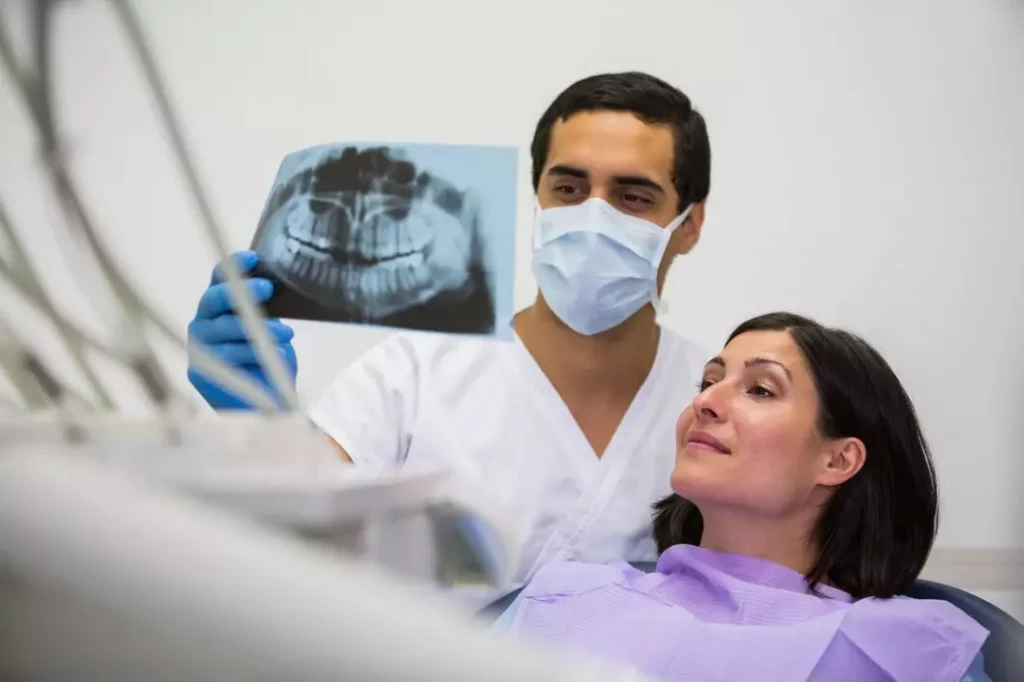Prestige Dental is the best local destination for “dental implants near me” in Clifton, NJ . If you’re looking to restore your smile’s beauty, functionality, and confidence, our experienced team of dental professionals is here to help. We specialize in providing high-quality dental implant services using the latest technology and personalized care.
Importance Of Dental Implants:
Dental implants play a vital role in restoring oral health, function, and aesthetics for individuals who have lost one or more teeth. They provide a permanent and durable solution that closely replicates the look, feel, and function of natural teeth. The importance of dental implants extends beyond cosmetic benefits, as they offer several significant advantages.
One of the primary reasons why dental implants are essential is their ability to preserve jawbone health. When a tooth is lost, the underlying jawbone begins to deteriorate due to lack of stimulation. Dental implants, consisting of titanium posts that are surgically placed into the jawbone, mimic the natural tooth root and provide the necessary stimulation to maintain bone density. This prevents further bone loss and helps preserve the integrity of the facial structure.
Additionally, dental implants restore proper chewing function. Missing teeth can make it challenging to bite into and chew food effectively, leading to dietary restrictions and potential nutritional deficiencies. Dental implants function just like natural teeth, allowing individuals to enjoy a wide variety of foods and maintain a balanced diet. By facilitating efficient mastication, dental implants support proper digestion and overall well-being.
What Are Dental Implants?
Dental implants are artificial tooth roots that are surgically placed into the jawbone to support replacement teeth or dental prostheses. They are designed to mimic the structure and function of natural teeth, providing a stable and long-lasting solution for individuals who have lost one or more teeth. Dental implants consist of three main components: the implant itself, an abutment, and a dental crown or prosthesis.
The implant is typically made of biocompatible titanium, a material that allows for osseointegration – the process of the implant fusing with the surrounding jawbone. This integration provides a strong and stable foundation for the replacement teeth. The abutment is a connector piece that attaches to the implant, protruding above the gumline. Finally, the dental crown or prosthesis is custom-made to match the color, shape, and size of the natural teeth, providing a natural-looking and functional restoration.
How Dental Implants Work:
Dental implants work by replacing the missing tooth root and providing support for the replacement teeth. The implant is surgically placed into the jawbone, where it gradually fuses with the bone through osseointegration. This process ensures that the implant becomes a permanent part of the jawbone, offering stability and durability.
Once the implant has fully integrated with the jawbone, the abutment is attached. The abutment serves as a connector between the implant and the dental crown or prosthesis. It is securely fastened onto the implant, providing a stable anchor for the replacement teeth.
The final step involves attaching the dental crown or prosthesis to the abutment. The dental crown is custom-made to match the surrounding natural teeth in color, shape, and size. It is carefully placed and secured onto the abutment, creating a seamless and natural-looking restoration.

Types Of Dental Implants:
There are several types of dental implants available, and the choice depends on the individual’s specific needs and oral health condition. Some common types of dental implants include:
- Endosteal Implants: These are the most common type of dental implants and are placed directly into the jawbone. They typically resemble small screws or cylinders and provide excellent stability and support for replacement teeth.
- Subperiosteal Implants: These implants are placed on top of the jawbone, just beneath the gum line. Subperiosteal implants are suitable for individuals with insufficient bone height or density to support endosteal implants.
- All-on-4 Implants: This innovative technique involves the placement of four dental implants strategically in the jawbone to support a full arch of replacement teeth. All-on-4 implants offer a more efficient and cost-effective solution for individuals needing a full mouth restoration.
Advantages Of Dental Implants:
Restored Functionality:
One of the primary benefits of dental implants is the restoration of functionality that comes with having a complete set of teeth. Unlike other tooth replacement options, such as removable dentures, dental implants are securely anchored in the jawbone, providing stability and strength similar to natural teeth. This stability allows individuals to bite, chew, and speak with confidence, without worrying about their teeth slipping or causing discomfort. With dental implants, individuals can enjoy a diverse range of foods, including tough and crunchy textures, improving their overall dietary choices and nutritional intake.
Improved Aesthetics:
Dental implants offer a remarkable improvement in aesthetics, creating a natural-looking and attractive smile. The custom-made dental crowns or prostheses are carefully designed to match the color, shape, and size of the surrounding natural teeth, ensuring a seamless and harmonious blend. The result is a smile that looks and feels natural, restoring confidence and enhancing overall appearance. Dental implants not only fill the gaps left by missing teeth but also provide a foundation for a radiant and confident smile.
Long-Term Durability:
One of the notable advantages of dental implants is their long-term durability. With proper care and maintenance, dental implants can last a lifetime. The titanium posts used in dental implants are biocompatible and fuse with the jawbone through osseointegration, creating a strong and stable foundation. This integration ensures that dental implants can withstand the forces of biting and chewing without compromising their integrity. Unlike other tooth replacement options that may require frequent repairs or replacements, dental implants offer a cost-effective solution with long-term benefits.
Preservation Of Jawbone Health:
When natural teeth are lost, the underlying jawbone begins to deteriorate due to the lack of stimulation. Dental implants address this issue by providing the necessary stimulation to the jawbone through osseointegration. The implants fuse with the bone, mimicking the function of natural tooth roots and preserving the integrity of the jawbone. This preservation of jawbone health prevents bone loss and maintains the overall facial structure. By preserving jawbone health, dental implants contribute to a more youthful appearance and prevent the sunken-in look that can occur with tooth loss.
The Dental Implant Process:
The dental implant process typically involves several stages, beginning with a comprehensive consultation and evaluation. During this initial phase, the dentist will assess the patient’s oral health, discuss their goals and expectations, and develop a personalized treatment plan. This may include dental imaging, such as X-rays or CT scans, to determine the quality and quantity of the jawbone.
Once the treatment plan is finalized, the next step is the surgical placement of the dental implants. This involves making a small incision in the gum tissue and carefully placing the implants into the jawbone. After the placement, a healing period is necessary to allow for osseointegration, during which the implants fuse with the jawbone, creating a stable and strong foundation.
Once osseointegration is complete, the dentist will attach the abutments to the implants. The abutments act as connectors between the implants and the dental prostheses. Afterward, the custom-made dental crowns or prostheses are placed onto the abutments, providing a natural-looking and functional restoration.
Throughout the dental implant process, the dentist closely monitors the healing and progress, ensuring the success of the procedure. Patients are provided with post-operative care instructions and scheduled for follow-up appointments to monitor the implants’ integration and address any concerns.
Importance Of Local Dental Implant Providers:
When it comes to dental implants, choosing a local dental implant provider offers several important advantages. Local dental implant providers have a deep understanding of the community’s oral health needs and are familiar with the specific dental concerns that patients in the area may face. They have built a reputation within the community and often have established relationships with local specialists and dental laboratories.
Another key advantage of choosing a local dental implant provider is the convenience it offers. Being in close proximity to the dental clinic makes it easier to schedule appointments and eliminates the need for extensive travel. In case of any emergencies or follow-up visits, patients can quickly reach the dental implant provider without significant disruptions to their daily routines.
Local dental implant providers also have a better understanding of insurance coverage and payment options that are commonly used in the area. They are well-versed in working with local insurance providers and can guide patients through the financial aspects of dental implant treatment. This ensures a smoother and more efficient process, minimizing potential complications or delays.

Researching Dental Implant Clinics:
Researching dental implant clinics is an essential step in finding the right provider for your dental implant needs. It’s important to gather information about the clinics in your area to ensure they meet your requirements and expectations. Here are some factors to consider during your research:
- Expertise and Qualifications: Look for dental implant clinics that have experienced dentists with specialized training in implant dentistry. Check their qualifications, certifications, and years of experience in performing dental implant procedures.
- Reputation and Reviews: Read reviews and testimonials from previous patients to gauge the clinic’s reputation. Positive feedback and satisfied patients are indicators of a reputable and reliable dental implant clinic. Online platforms and local community forums can provide valuable insights into the clinic’s quality of service and patient satisfaction.
- Technology and Facilities: Dental implant clinics equipped with modern technology and state-of-the-art facilities can offer more accurate diagnoses and efficient treatments. Look for clinics that invest in advanced equipment, such as 3D imaging technology, which enhances the precision and success of dental implant procedures.
- Treatment Approach and Options: Consider the treatment approaches and options provided by the dental implant clinics. Each patient’s needs are unique, so it’s crucial to choose a clinic that offers personalized treatment plans and a range of dental implant options to address individual requirements.
Scheduling Consultation:
Once you have narrowed down your choices and identified potential dental implant clinics, scheduling consultations is the next step in finding the right provider. Consultations offer an opportunity to meet the dental implant team, discuss your oral health goals, and get a better understanding of the treatment process. Here’s what you can expect during a consultation:
- Oral Examination: The dentist will perform a thorough examination of your oral health, including an assessment of your teeth, gums, and jawbone. This evaluation helps determine your eligibility for dental implant treatment and allows the dentist to develop a personalized treatment plan tailored to your needs.
- Discussion of Treatment Options: The dentist will explain the different dental implant options available to you and discuss the benefits and potential risks associated with each option. This will help you make an informed decision about the most suitable treatment approach for your specific case.
- Cost and Financial Planning: During the consultation, the dental implant clinic will provide you with detailed information about the cost of treatment and any available financing options. This allows you to plan your budget accordingly and explore potential payment plans or insurance coverage.
- Addressing Concerns and Questions: The consultation provides an opportunity for you to ask any questions or express any concerns you may have about the dental implant procedure. The dental implant team will provide clear and comprehensive answers, ensuring you feel confident and informed about your treatment.
At Prestige Dental in Clifton, NJ, we understand the importance of a beautiful and functional smile, which is why we offer exceptional dental implant services near you. Our skilled team of dental professionals utilizes advanced techniques and state-of-the-art technology to provide precise implant placement and natural-looking results. We believe that dental implants can transform not only your smile but also your overall quality of life, enabling you to eat, speak, and smile with confidence. If you’re seeking dental implants near you, look no further than Prestige Dental in Clifton, NJ. Schedule a consultation today and let us help you achieve the stunning smile you deserve.






